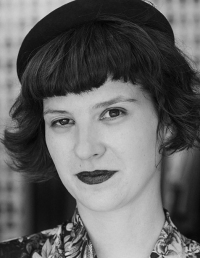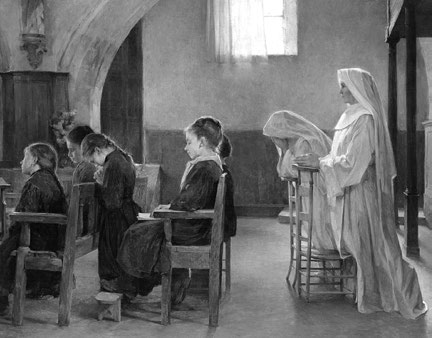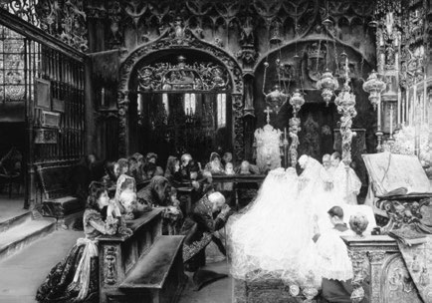
Hana Noble studied the history of Christian art at Catholic Theological Faculty of Charles University. Now she runs her own Lazy Eye fashion salon in Prague in Vinohrady specialising in American retro fashion from the 1950s.
Were you focused on the 20th century American culture already during your studies or were you attracted by other topics?
In my bachelor work I dealt with the 1990s art in the Czech Republic, in particular the works by Kintera, David Černý and Milena Dopitová. After completing my bachelor studies at Catholic and Theological Faculty of Charles University I went to Ústí and Labem to study curatorship. There I studied American art from 1995 to present. I was interested in the 1950s, but it was not my main specialisation
At our faculty, you studied the first year of a new field of study – the history of art. You experienced the beginnings of the Institute of Christian Art History at Catholic Theological Faculty of Charles University. You attended lectures of big personalities in the field about whom the current students only hear or whose books they read. Who do you remember most?
Perhaps professor Royt, who still works at the faculty. And of course docent Med, he had always been charming his red sweater. Doctor Slezák was also excellent. I even took my dog to his lectures.
In various interviews you mention that you started your business after your internships in London and New York where you had found your first retro dress. I would like to ask about those internships. What made you do them and how did you feel there?
When I went to Catholic Theological Faculty of Charles University, it was not possible to do such an internship. It was only possible to go to Dresden and to Vienna. Naturally, it was only for those who could speak German. And I couldn’t. I managed to arrange my internship only later when I studied in Ústí. Through a friend of mine I got a contact to a gallery in London and I signed an agreement with them thanks to which I could go there. I worked directly in the gallery, there were more interns like me and each of us was in charge of something else. But I think that more beneficial than working in a cultural institution was living in the city, going to exhibitions etc.
I arranged the second internship completely by myself. And I also paid for it by myself. I contacted the Czech Center and agreed my internship with them. I could only stay for three months but besides the centre, I went to exhibitions, libraries etc. Both were the most valuable experience for me, I got most from purely going abroad. I think all students should do similar internships, not only because of the language. They can gain new experience and see how it works somewhere else.
Recently I read in the web portal Artalk.cz an article about an exhibition of the Academy of Fine Arts graduates. The author of the article which was called “The Best and the Rest” was contemplating an idea whether it is right to follow only the successful graduates of Academy of Fine Arts and forget the “unsuccessful” ones. Most graduates actually use their qualification and artistic thinking in different professions and activities. I believe that in the field of history of art it is similar.
Only a few graduates become art historians and some work in protection of cultural heritage. Majority of them use their knowledge and skills in other professions. In my opinion, however, their studies were not in vain, studying history of art changes you in a certain way and influences your view of the world. Do you see it in the same way?

La Veille de la premiére communion, Henri Alphonse Lauremt-Desrousseaux, 1862-1906 (Source: Wikimedia Commons)I must say that I often think about it. I am glad that I decided to study art history. First I studied at secondary art school – stage design. Then I wanted to study UMPRUM or a similar school. But I was admitted to Catholic Theological Faculty of Charles University. There I found a great bunch of people. Thanks to my schoolmates but also people I knew from the secondary school who worked in artistic milieu I got to know many other people from this area, interesting projects and galleries. For example people connected with A. M. 180 Gallery, which influenced me significantly. I think that you should not hang your head that you will not become an art historian or curator. Such a job can only be done by a person who is gifted from God. And I was aware of the fact it was not me. So I chose a different path. But the actual school is important because it forms you. You only have to be open and perceive it. Not to beat your head against a brick wall when it is not possible to go that way. At such a moment it is necessary to find another way and draw experience from it. I got a lot from school and I like to remember my school life.
In the point of view of nowadays, you are a young and successful entrepreneur, mother of two, surely you know many famous people who wear your clothes. On the other hand, you also give your time and money to several foundations. I would like to ask you about your attitude, how you connect your business with the non-profit sphere and with your intention to help.

‘The First Communion’, Jose Gallegos y Arnosa, 1857-1917 (Source: Wikimedia Commons)I can say it was a coincidence and it started thanks to retro dresses. Moreover, I called my company after my eye defect. So it seemed appropriate to me to start helping others as well. Moreover, our shop is visited by many people with a handicap. The other day, a lady with an oxygen mask came there. And the people themselves tell me they feel very comfortable there. It makes me happy. So I started to think that we should not only talk about disabled people and their problem but also help them and motivate them. For example, we connected with the Pink Bubble organisation supporting people under 30 who suffered or suffer from cancer. Together we prepared a fashion show for Karlín ball where our dresses will be presented by the clients of this organisation together with actresses and models. I like to help these people, to motivate them and support them. We want to continue this cooperation in future as well. We want to help girls who lost their hair. Encourage them. I also intend to support the foundation financially, with a percentage from my earnings. Together with other designers we are also planning to make fashionable accessories specially for these women.
I must ask an obligatory question, because if a theologist have read the interview to this point, they must be wondering. Is there a family connection with the theologists Timothy and Ivana Noble or is it just a coincidence?
My husband is a foreigner. When I got married, we searched whether some other people with this surname lived in the Czech Republic. We found this couple. So, we know about them, but we are not related, and we have never met.
I’ve read that you do not sew but you choose fabric yourself. Where did you learn it, this is perhaps not taught at Catholic Theological Faculty of Charles University or in Ústí?
I can’t even sew on a button (laughter). But that’s not the point. It depends how you are able to “manage” it (laughter). First my Mum sewed for me, now I have a team of dressmakers. I only provide fabric and patters and put it all together. But without my team, it would be impossible. The experience with fabric I have gained from life. And I am still learning, what to choose and how to work with it. Maybe I’ll learn to sew one day (laughter).
The text was first published in DOXA vol. 4, no. 2, May 2018, pp. 17 - 18.